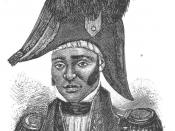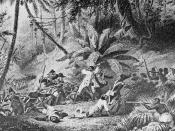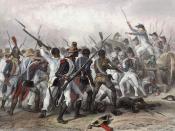"On January 1, 1804, Haiti declared independence, becoming the second independent nation in the West and the first free black republic in the world" ("History, par 11). This triumph followed the long and violent Haitian slave revolution in which Haiti, specifically the island of Saint Dominique suffered from. After the enlightenment the Rights of Man act provided equality among all Frenchmen, including blacks and mulattos. Fury rose in the plantation owners and they eventually got the act retracted in 1791. In reply, the Haitian slaves originally from Africa revolted. During the rebellion, "the Haitian slaves burned every plantation throughout the fertile regions of Haiti and executed all Frenchmen they could find" (Hooker, par 2). A vast amount of people living in Saint Dominique fled the island in fear of their lives. On the other hand, this revolution freed the African people of Saint Dominique from the inexcusable harsh treatments that they had to tolerate.
This revolt has been considered both the best thing that Haiti had ever experienced and also the most disastrous. The Haitian slave revolution was justified because of the harsh working conditions within the plantations, the callous living conditions, and the unbelievable successes.
The working conditions on the plantations within Saint Dominique provided reasoning for the slaves to revolt. During the rebellion, the plantations were the main workplace for the slaves. The sugar and coffee plantations provided France with their "most [rich] overseas possession" .
The development of plantation agriculture profoundly affected the island's ecology. African slaves toiled ceaselessly to clear forests for sugar fields, and massive erosion ensued, particularly on the steep marginal slopes that had been allocated to slaves for their subsistence crops
("Haiti", par 2)
The "plantations on Haiti [offered] some of the [cruelest] conditions that African-American slaves ever had to suffer" (Hooker, par...


